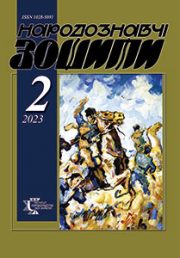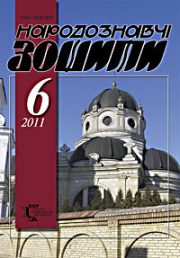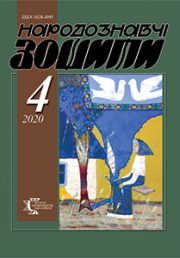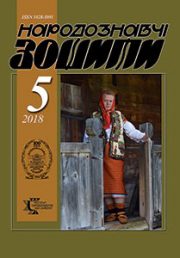The Ethnology Notebooks. 2021. № 5 (161), 1087—1095
UDK 94(477.83/.86):324]”1861/1914″
DOI https://doi.org/10.15407/nz2021.05.1087
ELECTIONS TO THE DIET OF THE GALICIA: THE NATIONAL CONTEXT AND REGIONAL APPROACH
CHORNOVOL Ihor
- ORCID ID: https://orcid.org/0000-002-1495-4417
- Habilitated Doctor of History,
- Lviv, Ukraine,
- Contacts: e-mail: ihorczornovol@yahoo.com
Abstract. Introduction. The Galician Sejm was the highest body of the self-government system of the Austrian province, called the Kingdom of Galicia and Lodomeria with the Grand Duchy of Cracow together with the principalities of Auschwitz and Zator. The Sejm held regularly in Lviv from 1861 to 1914. The number of all deputies of the Galician Sejm was 150, from 1896 154, after 1900 — 161. 199 — exactly this number of men represented the Ukrainian people in the Galician Diet, who from 1861 to 1913 won the election 267 times.
The object of the research is the Diet of the Galicia as well as the subject is its Ukrainian faction.
Problem statement. Continuing his previous research on the list of the Ukrainian deputies, now the author focused on the regional divide of the Ukrainian mandates. The purpose of this article is to learn how the Ukrainian mandates of the Diet’s deputies were distributed territorially and answer the question: what factors contributed to the activity of the Ukrainian voters?
There was not such a research in historiography, this determines its relevance.
Methods. Using mathematical methods and counting Ukrainian mandates, the author focused on the political geography of the elections to the Diet.
Results. The attached table shows that in only two counties Nadvirna and Zbaraz’ — the Ukrainian candidate always won the mandate, in three — Brody, Z’ovkva and Kalush — in 9 cases out of 10, in six — Drohobych, Z’ydachiv, Sniatyn, Stanislaviv, Stryi, Turka — in 8 out of 10 and so on. Lviv, Horodok, Dobromyl, Novy Sonch, Skalat and Jaroslav counties, who have managed to elect a Ukrainian just once in all history of the Galician Diet, completed the table. Such statistics of regional distribution of seats were determined by level of education, material standard of living, and self-awareness of voters of III and IV curias, factors of presence or absence of local political leaders, their ability to win the trust of voters, activity or passivity of Polish politicians and state administration in these areas. At the same time the influence of the Lviv Ukrainian parties` leadership on the election results was not significant.
Keywords: Regional history, Galicia, Galician Diet, elections.
Praca powstała w ramach Stypendium im. Konstytucji 3 Maja Fundacji Wolność i Demokracja w roku 2021. Stypendium Naukowe jest realizowane w ramach projektu „Spotkania Klubu Galicyjskiego. Jaremcze 2021” wspieranego ze środków Kancelarii Prezesa Rady Ministrów w ramach konkursu Polonia i Polacy za Granicą 2021.
Received 9.10.2021
REFERENCES
- Сhornovol, I. (2002). The Ukrainian Faction of the Galician Diet. 1861—1901. Essay on the History of the Ukrainian Parliamentarism. L’viv [in Ukrainian].
- Chornovol, I. (2010). 199 deputies of the Galician Diet. L’viv [in Ukrainian].
- Chornovol, I. (2018). The Ukrainian Faction of the Galician Diet. 1861—1914. L’viv [in Ukrainian].
- Nastiuk, M. (1993). The Diet of the Bukovyna: Structure, Competencies, and Activities (1861—1914). Visnyk L’viv s’koho universytetu. The Juridical Series, 30, 16—21 [in Ukrainian].
- Grodziski, S. (1993). The Diet of the Galicia. 1861—1914 (Vol. 1). Warszawa [in Polish].
- Eberhardt, P. (1994). The Changes of Population in Ukraine in the 20 Century. Warszawa [in Polish].
- Semczyszyn, M. (2014). The Galician Elections. The Activity of the Central Committe of the Elections for the Eastern Galicia in 1861–1906. Warszawa [in Polish].
- Dejchakivs’kyj, I. (2003). Josyf Huryk — the peasant deputy. Ivano-Frankivs’k [in Ukrainian].
- Tereshkun, Z. (1985). Uhryniv. Almanac of the Stanislaviv land. Collection of Materials on the History of Stanislaviv and Stanislavivshchyna (Vol. II). New York; Paris; Sydney; Toronto (Taras Shevchenko Scientific Society; The Ukrainian Archive, vol. XXIX) [in Ukrainian].
- (1912). Ruslan, 16 [in Ukrainian].
- Ostapchuk, Ya. (1968). A Breath from the Recent Past (the Thoughts and Memories from My Life). Zbaraz’chyna. The Collection of Memoirs, Articles, and Materials (Pp. 183—470). (The Ukrainian Archive, vol. XVII). Toronto [in Ukrainian].
- V. Stefanyk L’viv Scientific Library of the National Academy of Sciences of Ukraine. The Department of Manuscripts. F. 167. Op. II. Spr. 2909 [in Ukrainian].
- Chornovol, I. (2017). Own among Strangers, Strangers among Their Own: Fedorowiczs, Coat of Arms Oginec’, in the Context of the Ukrainian National Movement of the 19 Century. Essays on the History of the Galicia (Pp. 127—164) L’viv [in Ukrainian].
- Ostapchuk, Ya. (1968). A Breath from the Recent Past. Zbaraz’chyna. Toronto (Pp. 183—470) [in Ukrainian].
- Tymoshenko, L. (Ed.). (2009). Essays on the History of Drohobych (from the Ancient Times to the Beginning of the 21 century). Drohobych [in Ukrainian]
- Makukh, I. (2001). In the Public Service. Memoirs. Kyiv [in Ukrainian].
- Olesnyc’kyj, Ye. (2007). The Pages from My Life. Stryj [in Ukrainian].
- Chornovol, I. (2000). The Polish-Ukrainian Agreement in 1890—1894. L’viv [in Ukrainian].
- Barvins’ky, O. Memoirs of My Life (Part VI). T. Shevchenko Institute of Literature of the National Academy of Sciences of Ukraine. The Department of Manuscripts. F. 135. Spr. 56 [in Ukrainian].
- Arkusha, O. (2003). The Elections to the Galician Sejm of 1901: to the Problem of Political Modernization of the Ukrainian Society of the Galicia. Visnyk of Lviv National University. The Historical Series, 38 [in Ukrainian].
- (1877). From Election`s Circle Horodenka — Obertyn (Reminiscence on the Election). Slovo, 81 [in Ukrainian].
- Autobiography of Starukh Timotej, the Deputy of the Diet, clippings from Newspapers about His Life and Activity. The Central State Historical Archive of Ukraine in Lviv. F. 309. Op. 1. Spr. 227 [in Ukrainian].
- Andrusiak, T. (2011). The Starukhs. Three Generations of Representatives of the Ukrainian Legal Thought in the Galicia. Visnyk L’vivs’koho universytetu. The Juridical Series (Issue 54) [in Ukrainian].







